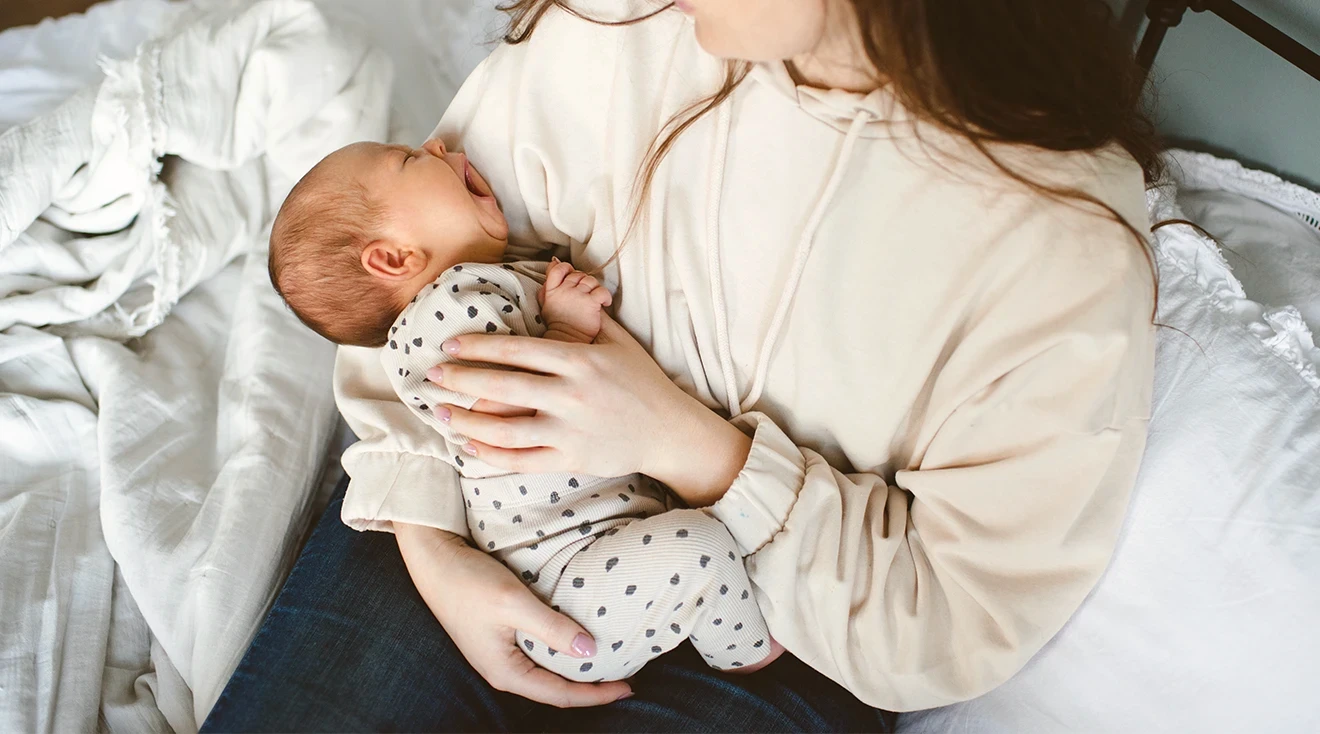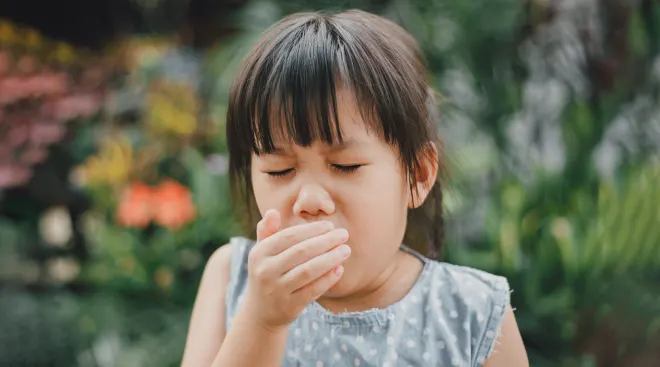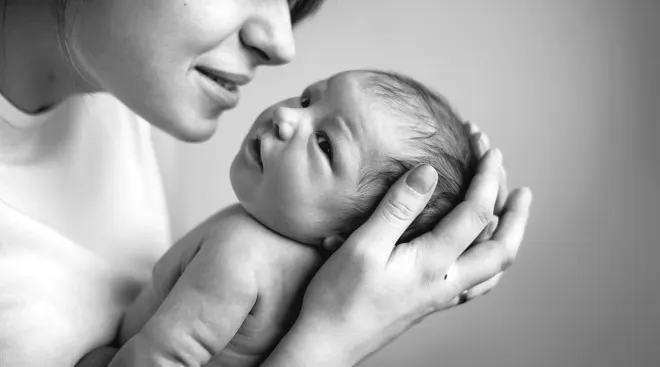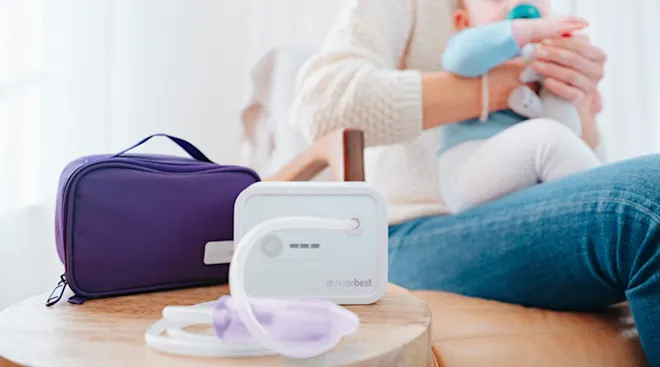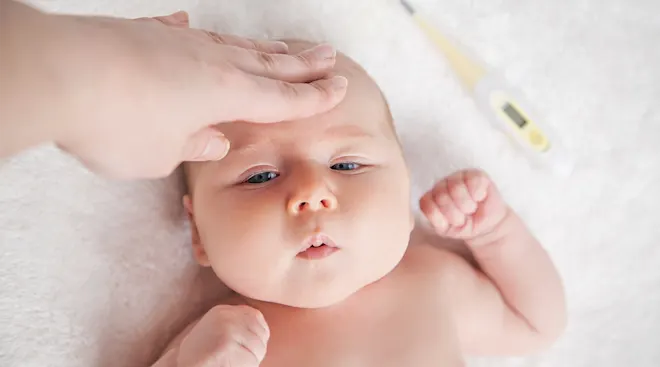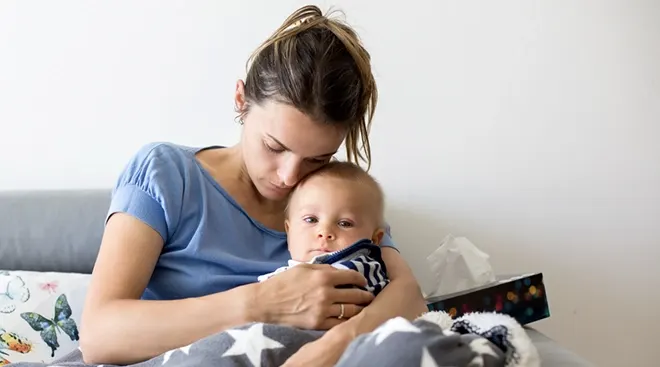Everything to Know About the Flu in Babies
Fever, sore throat and body aches are never fun, but it’s especially hard when it’s baby who’s suffering from the flu. Unfortunately, flu in babies happens more often than we’d like, so it’s a good idea to be prepared. Here’s how to spot telltale flu symptoms in babies, plus how to safely treat the virus and prevent your child from getting sick again.
Influenza, aka the flu, is a respiratory illness caused by viruses, says Danelle Fisher, MD, FAAP, chair of pediatrics at Providence Saint John’s Health Center in Santa Monica, California. Like many illnesses, the flu in babies can range in severity from mild to severe and can, in rare cases, potentially even be fatal. According to the Centers for Disease Control and Prevention (CDC), babies—particularly those under 6 months—have a higher risk of developing serious flu-related complications because they can’t yet be vaccinated.
Babies contract the flu the same way adults do: by coming into contact with influenza viruses when infected people cough, sneeze or talk, says Ari Cohen, MD, chief of the division of pediatric emergency medicine at the MassGeneral Hospital for Children in Boston. While person-to-person contact is the most common way baby flu is transmitted, little ones can also get sick from touching a surface that’s contaminated with the virus and then putting their hands in their mouth.
What’s more, the flu is easily passed from one person to the next—in fact, “we’re finding out that the flu tends to be a little more contagious than we thought,” Fisher says. People tend to be sick for a day before they start to exhibit symptoms, and may unknowingly pass it onto baby before they even realize they have the flu. There’s now evidence that little ones can get sick just by breathing or being in the same room as someone with the flu, Fisher says.
Unfortunately, it’s not uncommon for infants to come down with the flu. “They get it just like they get colds,” Cohen says. The number of baby flu cases each year ultimately depends on the severity of the flu season; if the flu is running rampant, babies are at a higher risk of contracting the illness too. According to estimates from the CDC, between 7,000 and 26,000 children under the age of 5 have been hospitalized since 2010 due to the flu. Tragically, during the 2022 to 2023 season, there were 106 pediatric deaths due to the flu, 41 of which occurred in children under the age of 5. The statistic is the highest it’s been since the COVID-19 pandemic started, the CDC reports.
When cold and flu season rolls around, so do a plethora of viruses—including the common cold, RSV and COVID. So how can you spot the flu in babies? Infants experience the same symptoms as adults, but of course can’t clearly tell you what they’re feeling. Plus, it might be hard to tell the difference between a cold and the flu in infants. But, unlike the cold, influenza tends to come on quickly and often prompts the following flu symptoms in babies:
- Fever
- Body aches
- Sore throat (which manifests as decreased appetite)
- Runny or stuffy nose
- Cough
- Vomiting
- Diarrhea
And let your pediatrician know right away if you see any of the following baby flu symptoms:
- Trouble breathing
- Bluish skin color
- Inability to eat
- No tears when crying
- Not waking or interacting with others
- Not wanting to be held
- Fever with a rash
Wondering how to tell between flu symptoms in babies and RSV? The National Foundation for Infectious Diseases says that unlike the other viruses, RSV is often accompanied by wheezing. As for the flu versus covid, the CDC says it can be hard to tell the difference between the flu in babies and COVID based on symptoms alone because many of them are the same. Ultimately, the best way to know if your child has the flu is with a test.
If baby is exhibiting flu-like symptoms, your pediatrician will likely give them a flu test in the office. If it’s positive, and you’ve caught it within the first 48 hours of baby showing symptoms, infants 2 weeks and older may be treated be treated with Tamiflu, an antiviral prescription medication that can shorten the course of flu in infants by a day and lower the risk of complications, says Gina Posner, MD, a pediatrician at MemorialCare Orange Coast Medical Center in Fountain Valley, California.
If your child’s symptoms are mild though, your pediatrician may recommend merely making them more comfortable. “I don’t treat the vast majority of pediatric patients with anything aside from Tylenol for achiness and relief,” Cohen says. However, every doctor is different and may prescribe an alternate course of treatment. Wondering if over-the-counter infant cold and flu medicine is safe to give? While Infants’ Tylenol may be used to relieve flu symptoms in babies and toddlers, it’s always best to check in with your pediatrician first.
To help alleviate baby’s flu symptoms and congestion at home, parents can use humidity (through a steam room or humidifier), as well as nasal aspirators. But the best way to treat the flu in babies is to make sure they get plenty of rest and drink lots of liquids.
How long does the flu last in kids?
There’s a pretty wide range in how long babies can be impacted by the flu. For some, baby flu is short lived, with a fever that lasts a few days and a cough that hangs on for a week, Posner says. In others, the fever can last a week and the cough can stick around for a month. “It’s hard to tell who is going to get it the worst,” she says.
Of course, the best way to keep your child safe from the flu is to do what you can to prevent baby flu from developing in the first place. Some things are out of your control, of course, but there are a few ways you can help keep your little one flu-free.
-
Practice good hand hygiene: Encourage others to always wash their hands thoroughly with soap and water before coming into contact with baby or any of their things, Fisher says.
-
Avoid being around sick people: If someone has a cough or runny nose, ask them to postpone their visit to see your little one.
-
Stay away from crowded areas: Keeping baby away from malls, stores and other crowded areas during flu season can help lower the risk, Posner says.
Of course, one of the best ways to prevent the flu in older infants is with the flu shot.
Flu shot for babies
The CDC strongly recommends the flu shot for babies who are 6 months and older. It’s given in two doses, four weeks apart, to help their little bodies mount the best antibody response, Fisher explains. It should be administered ideally by the end of October, before flu season is in full swing. There are several types of influenza viruses, but the shot protects baby against those that research suggests will be the most common that season. Because of this, the effectiveness of the flu shot for babies can vary from year to year, Posner says, but statistics show that kids who get the shot are less likely to have serious complications from the illness than those who weren’t vaccinated. (According to the CDC, most of the fatalities that occurred during the 2022 to 2023 season were in children who weren’t vaccinated against the flu.)
The flu shot can potentially prompt some side effects, but they tend to be incredibly mild, Cohen says. “Occasionally we see a low-grade fever or runny nose, but they’re temporary side effects and usually last for 24 to 48 hours,” he says. “I haven’t had any babies have any kind of severe reaction from the flu vaccine.”
Babies under 6 months old are too young to get the flu shot, so the best way to protect infants from the flu is to make sure baby’s caregivers get vaccinated. If you get the flu shot while pregnant, your body produces antibodies that then pass through the placenta to baby, Cohen says, helping to protect your little one even after they’re born. And if you breastfeed, you’ll continue to pass antibodies onto baby through your breast milk.
Luckily, there are many ways sick parents can prevent passing the flu to baby, including properly covering coughs and sneezing, wearing a mask and practicing good hand-washing and hygiene. Wondering if you can still breastfeed baby with the flu? The CDC says that you can. The flu cannot be transmitted through breast milk, and parents should continue to breastfeed regardless if they or baby has the flu. Just be careful to wash your hands with soap before touching baby or any of their things and wear a mask. If you’re too sick to breastfeed, the CDC says it’s also okay to have a healthy caregiver feed baby expressed breast milk from a bottle.
It can be tough—and downright scary—to watch baby suffer through the flu, but know there are ways to keep baby and your family protected. For any questions or concerns regarding the flu in babies or the flu vaccine, don’t hesitate to reach out to your pediatrician.
Please note: The Bump and the materials and information it contains are not intended to, and do not constitute, medical or other health advice or diagnosis and should not be used as such. You should always consult with a qualified physician or health professional about your specific circumstances.
Plus, more from The Bump:
Ari Cohen, MD, is the chief of the division of pediatric emergency medicine at the MassGeneral Hospital for Children in Boston. He also serves as a medical director for Boston MedFlight and is an assistant professor for emergency medicine at Harvard School of Medicine. He received his medical degree from the University of Chicago and completed his residency at Mount Sinai Medical Center in New York City. He also completed a pediatric emergency medicine fellowship at Boston Children’s Hospital.
Danelle Fisher, MD, FAAP, is the chair of pediatrics at Providence Saint John’s Health Center in Santa Monica, California. She earned her medical degree from Albery Einstein College of Medicine of Yeshiva University in New York City and completed her residency at the Children’s Hospital Los Angeles.
Gina Posner, MD, a pediatrician at MemorialCare Orange Coast Medical Center in Fountain Valley, California. She earned her medical degree from New York Medical College and for over 10 years has volunteered with various organizations in the US and Dominican Republic, mentoring and educating children and parents on different health topics.
Centers for Disease Control and Prevention, Influenza (Flu), January 2021
Centers for Disease Control and Prevention, Pinkbook: Influenza, August 2021
Centers for Disease Control and Prevention, Pediatric Flu Deaths Top 100 this Season; Most Unvaccinated, February 2023
National Foundation for Infectious Diseases, How to Tell the Difference between Flu, RSV, COVID-19, and the Common Cold
Centers for Disease Control and Prevention, Flu Symptoms & Complications, October 2022
Centers for Disease Control and Prevention, Influenza (Flu), Breastfeeding, January 2021
Learn how we ensure the accuracy of our content through our editorial and medical review process.
Navigate forward to interact with the calendar and select a date. Press the question mark key to get the keyboard shortcuts for changing dates.
































